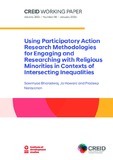| dc.contributor.author | Bharadwaj, Sowmyaa | |
| dc.contributor.author | Howard, Jo | |
| dc.contributor.author | Narayanan, Pradeep | |
| dc.coverage.spatial | India | en |
| dc.date.accessioned | 2021-01-08T17:25:28Z | |
| dc.date.available | 2021-01-08T17:25:28Z | |
| dc.date.issued | 2021-01 | |
| dc.identifier.citation | Bharadwaj, S.; Howard, J. and Narayanan, P. (2020) Using Participatory Action Research Methodologies for Engaging and Researching with Religious Minorities in Contexts of Intersecting Inequalities, CREID Working Paper 5, Coalition for Religious Equality and Inclusive Development, Brighton: Institute of Development Studies | en |
| dc.identifier.isbn | 978-1-78118-733-3 | |
| dc.identifier.uri | https://opendocs.ids.ac.uk/opendocs/handle/20.500.12413/15896 | |
| dc.description.abstract | While there is growing scholarship on the intersectional nature of people’s experience of marginalisation, analyses tend to ignore religion-based inequalities. A lack of Freedom of Religion and Belief (FoRB) undermines people’s possibilities of accessing services and rights and enjoying wellbeing (World Bank 2013; Narayan et al. 2000, Deneulin and Shahani 2009). In this paper, we discuss how religion and faith-based inequalities intersect with other horizontal and vertical inequalities, to create further exclusions within as well as between groups. We offer our experience of using participatory action research (PAR) methodologies to enable insights into lived experiences of intersecting inequalities. In particular, we reflect on intersecting inequalities in the context of India, and share some experiences of facilitating PAR processes with marginalised groups, such as Denotified Tribes (DNT). We introduce a FoRB lens to understand how DNT communities in India experience marginalisation and oppression. The examples discussed here focus on the intersection of religious belief with caste, tribal, gender and other socially constructed identities, as well as poverty. Through taking a PAR approach to working with these communities, we show how PAR can offer space for reflection, analysis, and sometimes action with relation to religion-based and other inequalities. We share some lessons that are useful for research, policy and practice, which we have learned about methods for working with vulnerable groups, about how religion-based inequalities intersect with others, and the assumptions and blind spots that can perpetuate these inequalities. | en |
| dc.description.sponsorship | Foreign Commonwealth and Development Office (FCDO) | en |
| dc.language.iso | en | en |
| dc.publisher | Institute of Development Studies | en |
| dc.relation.ispartofseries | CREID Working Paper;5 | |
| dc.rights.uri | http://creativecommons.org/licenses/by/4.0/ | en |
| dc.subject | Gender | en |
| dc.subject | Participation | en |
| dc.subject | Politics and Power | en |
| dc.subject | Rights | en |
| dc.title | Using Participatory Action Research Methodologies for Engaging and Researching with Religious Minorities in Contexts of Intersecting Inequalities | en |
| dc.type | Series paper (IDS) | en |
| dc.rights.holder | Institute of Development Studies | en |
| dc.identifier.team | Power and Popular Politics | en |
| dc.identifier.doi | 10.19088/CREID.2020.009 | |
| rioxxterms.funder | Department for International Development, UK Government | en |
| rioxxterms.identifier.project | Coalition for Religious Equality and Inclusive Development (CREID) | en |
| rioxxterms.version | VoR | en |
| rioxxterms.versionofrecord | 10.19088/CREID.2020.009 | en |
| rioxxterms.funder.project | 7a473ec6-92f8-49ff-98df-9ec27d8d5fe6 | en |


